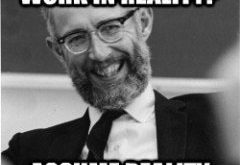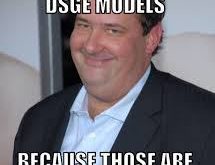Simon Wren-Lewis — flimflam defender of economic orthodoxy Again and again, Oxford professor Simon Wren-Lewis rides out to defend orthodox macroeconomic theory against attacks from ‘heterodox’ critics like yours truly. A couple of years ago, it was the rational expectations hypothesis (REH) he wanted to save: It is not a debate about rational expectations in the abstract, but about a choice between different ways of modelling expectations, none of which...
Read More »RBC models –the art of missing the point completely
RBC models –the art of missing the point completely The real business cycle program is part of the larger new classical macroeconomic research program. Proponents of these models often promote them as models that provide satisfactory microfoundations for macroeconomics … The claim for providing microfoundations is largely based on the fact that new classical models in general, and real business cycle models in particular, model the representative agent as...
Read More »Robert Lucas and the triumph of empty formalism
Robert Lucas and the triumph of empty formalism Vielleicht ist diese Grundperspektive der radikalen Trennung von Form und Gehalt hilfreich, einige zunächst überaus paradoxe Äußerungen von Lucas etwas zu erhellen. Erinnert man sich der Forderungen von Lucas, die Makroökonomik zwingend auf Basis der klassischen Postulate, die Lucas und Sargent (1978) als (a) „Markträumung“ und (b) „Eigennutz“ umrissen hatten, zu errichten, so erstaunt man doch angesichts...
Read More »Solow kicking Lucas and Sargent in the pants
Solow kicking Lucas and Sargent in the pants In opening the conference, Frank Morris mentioned his disappointment or disillusionment – which many others share – that the analytical success of the 1960s didn’t survive that decade. I think we all knew, even back in the 1960s, that as Geof put it, “inflation doesn’t wait for full employment.” These days inflation doesn’t even seem to care if full employment is going along on the trip … The question is: what...
Read More »The logical fallacy that good science builds on
The logical fallacy that good science builds on In economics most models and theories build on a kind of argumentation pattern that looks like this: Premise 1: All Chicago economists believe in REH Premise 2: Robert Lucas is a Chicago economist —————————————————————– Conclusion: Robert Lucas believes in REH Among philosophers of science this is treated as an example of a logically valid deductive inference (and, following Quine, whenever logic is used in...
Read More »Cutting wages is not the solution
Cutting wages is not the solution A couple of years ago yours truly had a discussion with the chairman of the Swedish Royal Academy of Sciences (yes, the one that yearly presents the winners of The Sveriges Riksbank Prize in Economic Sciences in Memory of Alfred Nobel). What started the discussion was the allegation that the level of employment in the long run is a result of people’s own rational intertemporal choices and that how much people work basically...
Read More »Debunking the NAIRU myth
Debunking the NAIRU myth In our extended NAIRU model, labor productivity growth is included in the wage bargaining process … The logical consequence of this broadening of the theoretical canvas has been that the NAIRU becomes endogenous itself and ceases to be an attractor — Milton Friedman’s natural, stable and timeless equilibrium point from which the system cannot permanently deviate. In our model, a deviation from the initial equilibrium affects not...
Read More »Modern macroeconomics — too much micro and not enough macro
Modern macroeconomics — too much micro and not enough macro This paper … looks back into the pre-crisis (pre-2007) intellectual history of macroeconomic theory and argues that modern macro neglects the basic sources of both impulses and propagation mechanisms of business cycles. The basic problem is that modern macro consists of too much micro and not enough macro. Focus on individual preferences and production functions misses the essence of macro...
Read More »New Keynesian DSGE models and the ‘representative lemming’
If all agents are supposed to have rational expectations, it becomes convenient to assume also that they all have the same expectation and thence tempting to jump to the conclusion that the collective of agents behaves as one. The usual objection to representative agent models has been that it fails to take into account well-documented systematic differences in behaviour between age groups, income classes, etc. In the financial crisis context, however, the objection is rather...
Read More »Paul Samuelson’s balanced budget religion
Paul Samuelson’s balanced budget religion I think there is an element of truth in the view that the superstition that the budget must be balanced at all times [is necessary]. Once it is debunked, [it] takes away one of the bulwarks that every society must have against expenditure out of control. There must be discipline in the allocation of resources or you will have anarchistic chaos and inefficiency. And one of the functions of old fashioned religion was...
Read More » Heterodox
Heterodox










